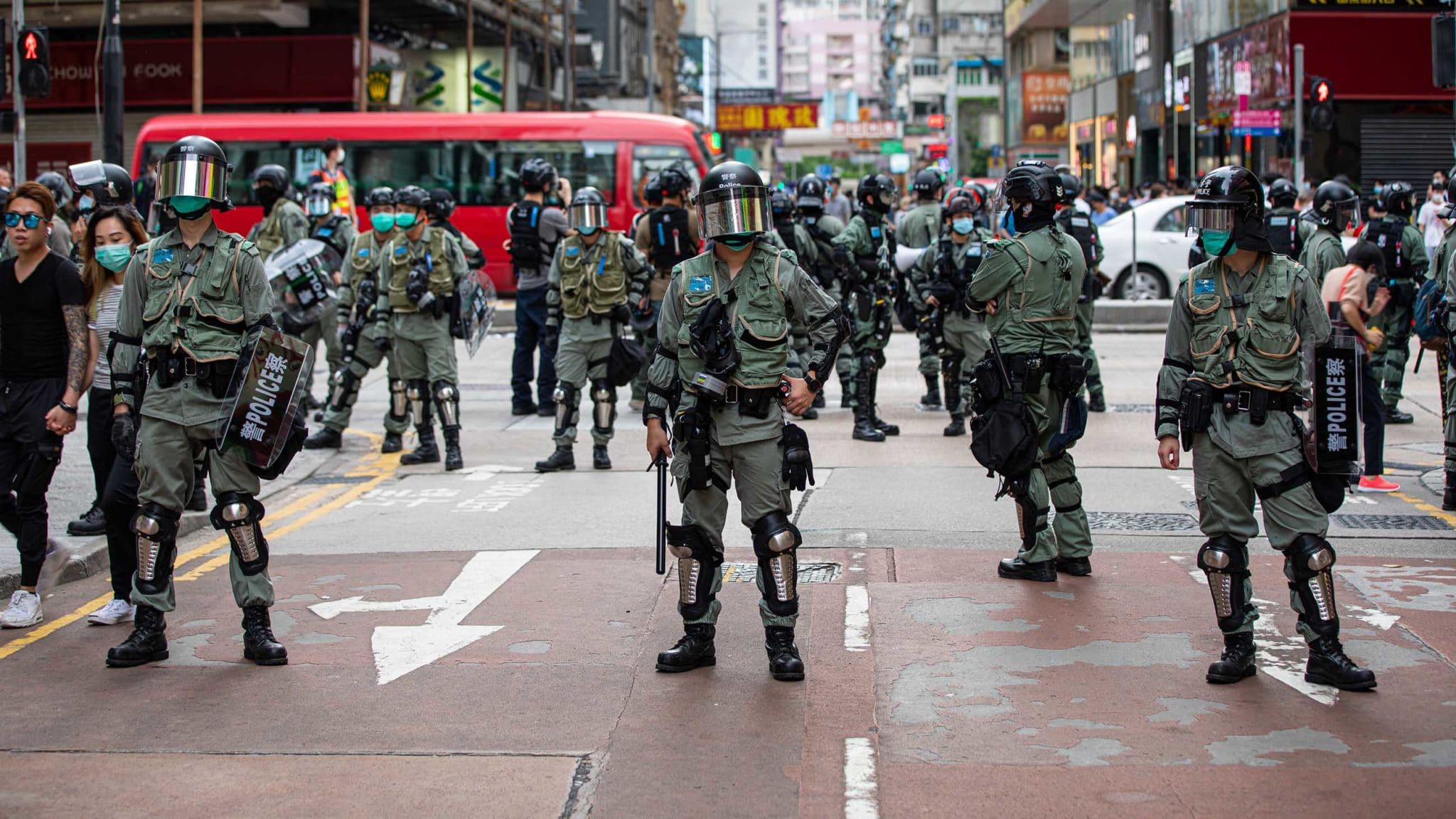Against a backdrop of rising death tolls and intra-national bickering over when and how to ease Covid-19 public health restrictions, autocrats around the world appeared to be seizing the opportunity to solidify — or expand — their power.
In China, mass protests and clashes between pro-democracy demonstrators and police followed efforts by the government in Beijing to assert greater control over the semi-autonomous region of Hong Kong. A sweeping national security plan, announced late last week and approved on Thursday, could permit China’s leadership to limit dissent and expand the presence of its security forces in the coastal enclave, where protestors have been battling to maintain a fragile democracy for months.
“It’s an official death sentence for Hong Kong,” legal scholar Alvin Y.H. Cheung told Vox. In response to the measures, U.S. Secretary of State Mike Pompeo said that Hong Kong no longer “maintains a high degree of autonomy from China.”
Security forces have also cited public health restrictions as a pretense to break up pro-democracy protests in Hong Kong, as well as to expand surveillance of people in mainland China — but they are far from alone. For months, human rights and civil liberties advocates have warned that leaders in Myanmar, Cambodia, Turkey and other countries are using public health measures as a pretext for authoritarian politics. In April, CNN reported that the Philippines, under autocratic leader Rodrigo Duterte, “had arrested almost as many people for violating Covid-19 curfews and lockdowns as it had tested for the virus.” And in Hungary, Viktor Orbán claimed broad emergency powers that some analysts described as dictatorial — although he’s reportedly giving those powers back later in June.
There’s little evidence that authoritarian politics actually lead to effective public health interventions. Indeed, some of the countries that have responded most effectively to the pandemic — most notably Taiwan and South Korea — are democracies that relied on swift, transparent, expert-driven public health measures to control the outbreak. (Elsewhere, the estimated death toll from Covid-19 officially passed 100,000 in the U.S. this week — the highest number of deaths in any country — and the global epicenter of the pandemic shifted to Latin America.)
Still, the pandemic is likely to shape the trajectories of global politics for years to come, and in ways that are not yet clear. Indeed, past outbreaks have helped form the world we live in today, author and environmental activist Richard Heinberg argued in Undark earlier this year. And, he wrote, “the ways that nations respond to the pandemic today will largely determine their fortunes and fates over the next couple of decades at least, and perhaps beyond.”
In this week’s Abstracts, we deliver a roundup of coronavirus stories that defined the week’s news, and that are likely to be relevant in the weeks ahead.
• Citing safety concerns, the World Health Organization stopped a major study of hydroxychloroquine.
In March, U.S. President Donald J. Trump touted the promise of hydroxychloroquine, a drug best known for treating malaria and lupus, as a possible “game changer” in the fight against Covid-19. Within days, shortages of the drug were being reported nationwide. Even as numerous physicians, including Anthony Fauci, director of the National Institute of Allergy and Infectious Disease, warned that there was no good data supporting such claims, the president continued to hype the medication, announcing this month that he was taking it as a coronavirus preventative. Last week, a study of almost 100,000 patients concluded that the drug, in fact, increased Covid-19 patients’ risk of dying, and that it could cause dangerous heart arrhythmias. This week, the World Health Organization made the decision to halt, at least for now, a major trial of the drug’s effectiveness due to safety concerns. For the same reason, Italy, France, and Belgium have now halted its use for treating Covid-19. Meanwhile, Fauci said on Wednesday that the trials that have been completed suggest that hydroxychloroquine is not effective against Covid-19. The drug has not been banned in the U.S. for use against Covid-19, and Fauci did not advocate for such a move. But he did his best to discourage its use: “The scientific data is really quite evident now about the lack of efficacy,” he said.
• Executives at Moderna, a biotech company with a prominent coronavirus vaccine candidate, have been dumping stock.
Top executives at Moderna have sold stock totaling more than $89 million so far this year, according to new reporting from CNN and STAT News. The transactions have raised questions among analysts and investors about why, exactly, executives would be selling now, when Moderna’s experimental vaccine, should it prove effective, would cause the stock’s value to surge. The trades took place via a rule that allows a company’s shareholders to make pre-scheduled trades, meaning the timing of the stock sales could have been planned well in advance. But the rule, as structured, makes it difficult to distinguish legitimate trades from those based on insider information. “There’s always that other possibility — that these guys really know this whole thing is bogus and they’re selling while the selling is good,” Thomas Lys, a professor of accounting at Northwestern University, told STAT News. “But you can’t tell from the data which one it is, and they certainly have plausible deniability.” Last week CNN reported that, following a 30 percent rise in stock value from early trial results, top executives sold off almost $30 million worth of shares. Starting in February, Moderna’s chief medical officer, Tal Zaks, began selling 10,000 shares a week, making more than $18 million in profit. He now holds zero shares in the company.
• As Covid-19 spreads in Russia, analysts struggle to gauge its true impact.
Russian President Vladimir Putin said Tuesday in a televised appearance that the country had passed its peak of Covid-19 cases. The same day, Russian officials reported the country’s highest daily death count so far: 174. As of Thursday, the country has reported 379,051 cases and 4,142 deaths, a case-fatality ratio of just over 1 percent, which is considerably lower than other hard-hit countries like Brazil, the U.K., and the U.S. Many outside experts have expressed doubt about the Kremlin’s tallies, with some news outlets constructing their own estimates of the country’s case-fatality ratio based on overall mortality statistics. Recent Covid-19 outbreaks in the southern republic of Dagestan and in long-term care homes across the country have led locals to publicly decry the inaccuracy of official statistics, which some have said have left them in the dark about the pandemic’s severity. In one recent poll, one-in-three Russian doctors reported being told to label Covid-19 deaths as being caused by a different disease. At the same time, some medical workers say they are keeping their own tallies of how many colleagues have died of Covid-19, a figure they say is also undercounted in official statistics.
• As a major trial of a promising vaccine gears up, researchers worry they’ll be unable to gauge whether the vaccine actually works.
Falling rates of Covid-19 infection in the U.K. have cast a major vaccine trial into limbo. Days after Oxford University announced that it was expanding trials of a vaccine to include more than 10,000 participants, the project’s leader, Adrian Hill, told an interviewer that the trial had only a 50 percent chance of success, due to worries that natural rates of infections may fall so low that it would be difficult to tell if the vaccine works. Last week, the U.S. government pledged $1.2 billion toward development of the vaccine, one of roughly ten vaccines currently undergoing human trials. Researchers have expressed optimism that the first doses, which are being developed in partnership with the British drugmaker AstraZeneca, could be ready this fall, assuming it performs well in trials. But the trials’ final phase, which compares infection rates in vaccinated and unvaccinated study groups, could be inconclusive if infection rates are naturally low. If that ends up being the case, AstraZeneca is not ruling out the possibility of recruiting volunteers to be exposed deliberately to the virus, a testing strategy that has been endorsed by some leading scientists, but that also raises serious ethical issues. For now, though, AstraZeneca chief Pascal Soriot said it’s still too early to make that decision.
• New York City may begin reopening in June, as infections continue to drop.
Over the past few weeks, eight regions of New York State have begun reopening after meeting a set of requirements put forth by Gov. Andrew Cuomo — including a decline in deaths and a decline in total hospitalizations. Long Island, which has seen nearly 4,000 deaths from Covid-19, also began its first phase of reopening on Wednesday, leaving New York City, which has accounted for around one-fifth of the country’s Covid-19 fatalities, as the last area to remain closed. Mayor Bill de Blasio has said he hopes the city can begin its reopening process in the first half of next month. The United States’ most densely populated city, New York quickly became a hot spot for the SARS-CoV-2 virus, infecting more than 200,000 and causing nearly 21,000 deaths to date. Despite a steady drop in new infections, it has not yet met state metrics regarding available hospital beds and contact tracers. Still, some small businesses say they plan to reopen soon — with or without permission.
There’s plenty of excellent reporting and analysis available.
Below is a list of some of the journalists, experts, and publications that Undark is following.
- Helen Branswell (@HelenBranswell), senior writer, infectious diseases, STAT
- Peter Sandman and Jody Lanard, risk communication experts
- Kai Kupferschmidt (@kakape), molecular biologist and science journalist, Science Magazine
- Trevor Bedford (@trvrb), computational biologist, Fred Hutchinson Cancer Research Center, Seattle
- Lawrence Gostin (@lawrencegostin), professor of global health law, Georgetown University
- Muge Cevik (@mugecevik), infectious disease researcher, University of St. Andrews
- A. Marm Kilpatrick (@DiseaseEcology), infectious disease ecologist, UC-Santa Cruz
- Julia Belluz (@juliaoftoronto), health correspondent, Vox
- Ed Yong (@edyong209), science writer, The Atlantic
- Kaiser Health News, full coronavirus coverage
- ProPublica, full coronavirus coverage
- U.S. Centers for Disease Control and Prevention, latest coronavirus news
- World Health Organization, rolling coronavirus updates
- Global Covid-19 Case Tracker, Johns Hopkins Center for Systems Science and Engineering
- Brief19, a review of Covid-19 research and policy
- The Covid-19 Tracking Project
- The Syllabus, Coronavirus Reading Lists
- Virus Academics Twitter list
Undark will continue to provide weekly roundups of Covid-19 news each Friday for as long as the pandemic continues. You can find our own Covid-19 coverage here.
Deborah Blum, Lucas Haugen, Jane Roberts, Frankie Schembri, and Ashley Smart contributed to this roundup.










